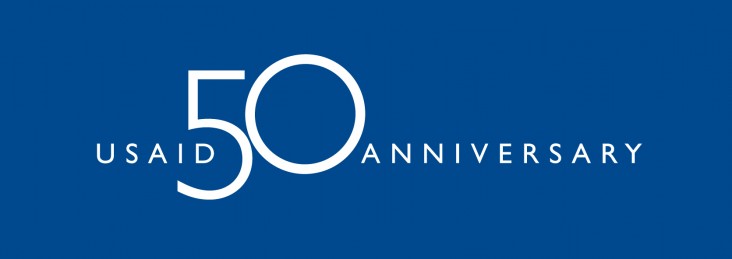
For Immediate Release
Today, the U.S. Agency for International Development (USAID) commemorates its 50th anniversary. USAID's history goes back to the Marshall Plan reconstruction of Europe after World War Two and the Truman Administration's Point Four Program. On September 4, 1961, the Congress passed the Foreign Assistance Act. The Act mandated the creation of an agency to administer economic assistance programs, and on November 3, 1961, President John F. Kennedy established USAID.
USAID is the foreign assistance organization of the U.S. Government whose primary emphasis is on long-term economic and social development. USAID programs support agriculture and trade; global health; and democracy and humanitarian assistance.
Throughout its 50-year history, USAID has worked with countries and communities across the globe to implement its mandate. U.S. foreign assistance programs have a long and distinguished list of accomplishments.
Oral rehydration therapy, a low cost and easily administered solution developed through USAID programs in Bangladesh, is credited with saving tens of millions of lives around the globe. Agricultural research sponsored by the United States sparked the "Green Revolution" in India. These breakthroughs in agricultural technology and practices resulted in the most dramatic increase in agricultural yields and production in the history of mankind, allowing nations like India and Bangladesh to become nearly food self-sufficient. Infant and child death rates in the developing world have been reduced by 50 percent. Millions of entrepreneurs around the world (many of them women) have started or improved small businesses through USAID assistance. More than 3 million lives are saved every year through USAID programs. More than 50 million couples worldwide use family planning as a direct result of USAID's population program. These are just a few examples of what the one half of one percent of the federal budget dedicated to economic and humanitarian assistance has achieved.
Today, USAID is transforming from a traditional aid agency into a modern development enterprise, investing in innovative, cost-effective, results-based solutions to advance prosperity and security in the developing world. We are implementing innovative strategies to deliver meaningful results at lower costs.
Feed the Future, Global Health Initiative and Strengthening Democracy and Governance are USAID’s current top priority initiatives. A main focus of Feed the Future is to reduce poverty and undernutrition. Over the next five years, the initiative will assist 18 million vulnerable women, children and family members – mostly smallholder farmers – to escape hunger and poverty. Through the Global Health Initiative, the United States is investing $63 billion over six years to help partner countries improve health outcomes through strengthened health systems - with a particular focus on bolstering the health of women, newborns and children by combating infectious diseases and providing quality health services. Aiming at Strengthening Democracy and Governance around the world, USAID is funding new open government technologies to quickly and significantly increase transparency.
In Azerbaijan, USAID works to help bring positive and lasting change to the country and its people. Today, USAID/Azerbaijan supports more than 15 programs in economic growth, democracy and governance, and health. Since Azerbaijan’s independence, USAID has provided over $300 million of financial assistance and technical expertise. USAID programs cooperate with the Government of Azerbaijan, non-government organizations, businesses, and communities to help improve laws, promote human and political rights, engage citizens, expand jobs, increase incomes, and improve the health and quality of life of Azerbaijan's people.
“On behalf of all the men and women of USAID in Azerbaijan, I would like to thank the Azerbaijani people for your partnership and friendship.” said Michael Greene, USAID/Azerbaijan Mission Director. “USAID will continue to work with the Government of Azerbaijan and Azerbaijani people to further support economic, democratic and health development in Azerbaijan.”







Comment
Make a general inquiry or suggest an improvement.